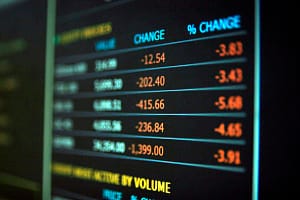The Nasdaq index fell by 1.9%, marking its largest single-day decline in two months, while the S&P 500 and Dow Jones indices dropped by 1.4% and 1.3%, respectively, reaching their lowest levels since June.
The 30-year Treasury bond yield rose to over 4.9%, the highest level since 2007, while the 10-year Treasury yield exceeded 4.8% for the first time since August 2007. The dollar index traded sideways, and oil prices increased, while cryptocurrency prices declined.
The political battles in Washington have become increasingly fierce, even when the risks were not high. Congressional disputes between Democrats and Republicans could potentially lead to another credit rating downgrade, which could significantly harm the U.S. economy.
The disagreement between the parties nearly led to the United States defaulting on its debt for the first time in nearly 250 years. Over the weekend, the government narrowly avoided a shutdown thanks to an agreement brokered by Republican Representative Kevin McCarthy with Democrats.
However, the move to secure government funding until mid-November led to the ousting of McCarthy as Speaker of the House in a historic vote yesterday.
I do not expect this development to go unnoticed by credit rating agency Moody’s, the last of the three major credit rating agencies to grant the United States its highest AAA rating.
The last time the U.S. had its debt rating downgraded by another major credit rating agency was in 2011 by Standard & Poor’s. While lawmakers managed to reach a last-minute agreement to avoid defaulting on the debt, doubts about the government’s credibility in terms of debt repayment within the allotted time frame have grown stronger.
At that time, Standard & Poor’s downgrade had significant market effects, leading to sharp stock market declines and a significant rise in bond yields.
Similarly, in August of last year, credit rating agency Fitch lowered the U.S. debt rating from AAA to AA+, causing stock market declines and pushing the yield on the 10-year Treasury bond to its highest level since November. However, markets eventually recovered those losses.
Last week, Moody’s warned that a government shutdown could prompt them to downgrade the U.S. debt rating. The markets were already experiencing high volatility and instability yesterday before the vote to oust McCarthy. U.S. Treasury bond yields reached levels not seen in over a decade, raising concerns among investors that rising interest rates could further stress the housing market.
A Moody’s downgrade could lead to higher Treasury bond yields, highlighting the growing risks associated with holding U.S. debt.
This is likely to increase the chances of interest rate hikes on U.S. bond yields, negatively impacting stock indices, gold, currencies, and dollar-denominated assets. It could also increase the pressures facing the U.S. economy and potentially raise the likelihood of an economic recession.





Leave a Comment